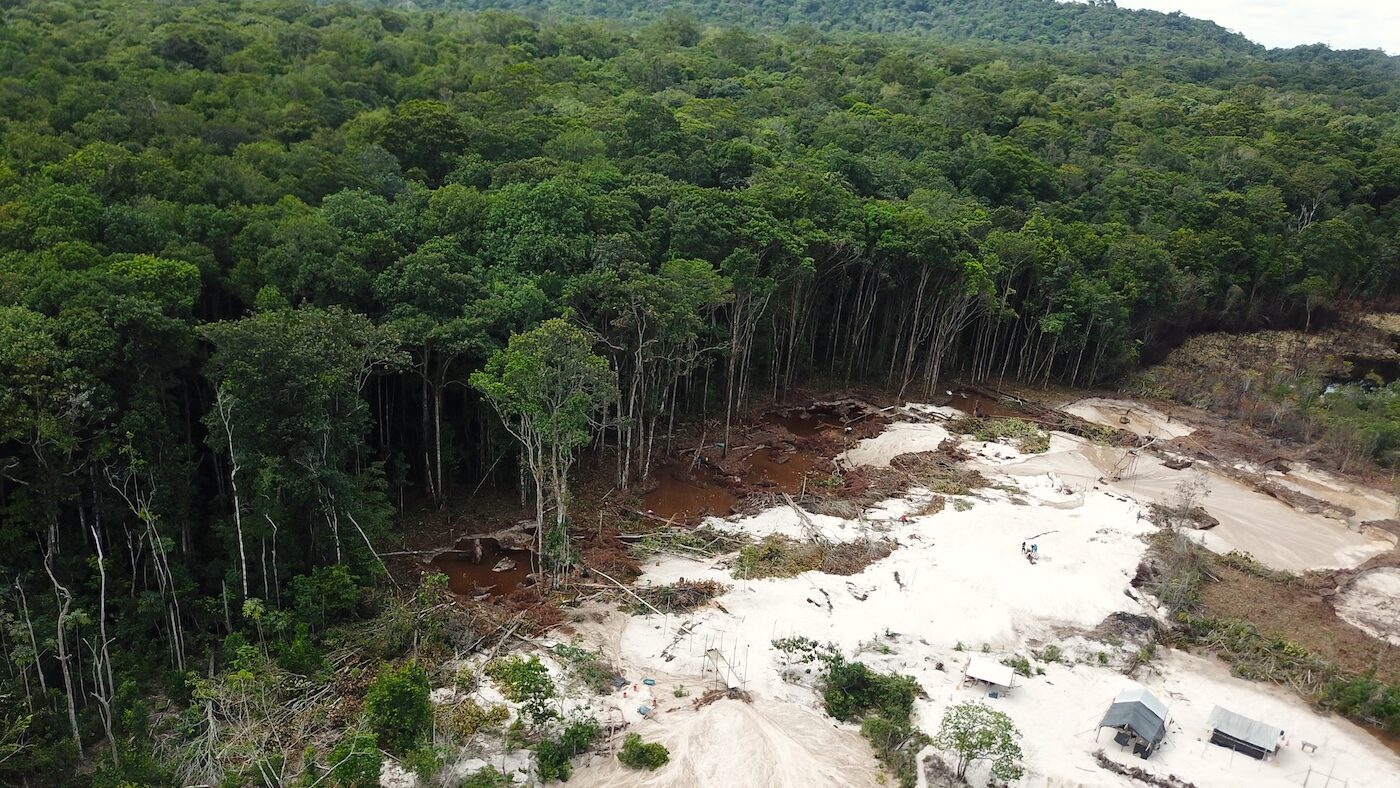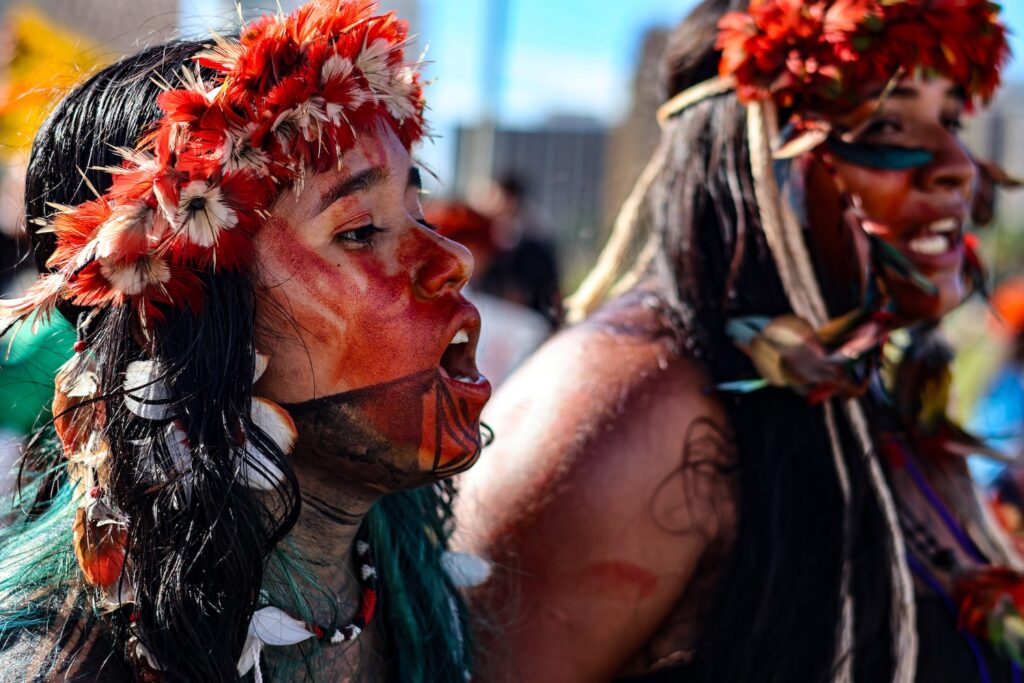- Across the US, Brazil, and Ecuador, power is shifting to agribusinesses and extractive industries, as environmental protections are rolled back and Indigenous rights are dismantled.
- Despite the loss of critical international funding, Indigenous communities remain on the frontlines, defending their forests, their rights, and our global climate.
- In 2024, with support from Rainforest Foundation US, Indigenous partners protected forests that absorbed as much carbon as the annual emissions of 2 million cars or 1.3 million US homes.
Right now, across the United States, Brazil and Ecuador, hard-won environmental protections are being dismantled at an alarming pace, putting the Amazon, the world’s largest rainforest and ancestral home to over a million Indigenous peoples, at great risk. Yet, in the face of this growing crisis, Rainforest Foundation US’s (RFUS) Indigenous partners continue to lead the fight, defending their forests, their rights, and our collective future. In this critical moment, every tree left standing is essential.
Environmental Rollbacks
In the United States (US), the “One Big Beautiful Bill Act” represents one of the most aggressive rollbacks of climate policy in recent history. It prioritizes fossil fuel expansion over climate action, opening vast stretches of land and water to oil and gas drilling, boosting coal, and stalling the development of clean energy infrastructure—making it more profitable to pollute. As fossil fuels gain ground, the bill also slashes funding for critical climate programs, including support for forest protection in Central and South America. At the same time, essential support for Indigenous-led forest protection is vanishing as recent USAID funding cuts take effect. Together, these actions are undermining Indigenous peoples’ efforts to protect rainforests, stewardship that is vital to keeping carbon-rich forests standing.
USAID support for longtime RFUS partner, the Indigenous Council of Roraima (CIR), was cut in April. The support had helped CIR defend Indigenous lands from illegal gold mining, a persistent threat in northern Brazil. Now, with this critical funding gone, those lands are increasingly vulnerable to criminal activity—a trend which has already fueled public health emergencies across the region.

Indigenous Rights Undermined in the Amazon
Meanwhile, across the Amazon basin, Indigenous rights—and the decades-long fight to defend them—are under mounting threat. Many South American governments are rolling back protections, clearing the way for unchecked exploitation.
In Brazil, lawmakers have passed what many call the most damaging environmental rollback in 40 years. The so-called “Devastation Bill” allows medium-impact projects, including most mining and agribusiness, to self-approve licenses online, with no prior impact studies or regulatory oversight. Federal agencies would only have authority over fully titled Indigenous lands, leaving the more than 30% of territories still awaiting full legal recognition completely exposed. It’s a sweeping handover of power to agribusinesses and extractive industries and a major blow to Indigenous rights and their future. These rollbacks come as deforestation in Brazil surges. In May alone, forest loss in the Amazon jumped 92% compared with the same month in 2024, contributing to a 27% increase in 2025 so far, according to data from Brazil’s Environment and Climate Change Ministry.1
In Ecuador, the situation is equally troubling. The National Assembly recently approved a new law on protected areas that has sparked backlash from Indigenous peoples. The law allows private and even foreign companies to manage conservation zones, triggering strong opposition from Indigenous groups. Many fear this will open the door to displacement, increased resource extraction, and a dismantling of Indigenous and environmental protections, including the right to Free, Prior, and Informed consent enshrined in Ecuador’s Constitution. Critics say the law ignores ancestral ownership, unilaterally imposing protected areas over Indigenous territories without consent.
Then, on July 24, Ecuadorian President Daniel Noboa took an even more drastic step. Through Executive Order 60, he dissolved the Ministry of the Environment, Water, and Ecological Transition, transferring its responsibilities to the Ministry of Energy and Mines. This move eliminates Ecuador’s independent environmental oversight and hands authority to the very agency tasked with promoting oil and mining.

What Happens in the Amazon Affects Us All
Scientists have warned for years: the Amazon is nearing a dangerous tipping point. Beyond it, large parts of the rainforest could begin an irreversible transformation into a degraded savannah, marked by sparse vegetation, collapsing biodiversity, and catastrophic consequences for Indigenous peoples and the global climate. This shift could be triggered if deforestation reaches 20–25%. And we’re already alarmingly close: 18% of the forest has been lost.2
We’re already seeing the signs. In 2024, the Amazon went through its worst drought on record. The dry season is getting longer, rainfall is down, and in some places, trees are dying so fast the forest is actually releasing more carbon than it stores. If this keeps up, the Amazon could hit a point of no return within a few decades. That kind of collapse would have a tremendous global impact.
– Christine Halvorson, Program Director at Rainforest Foundation US
Hope Grows Where Forests Stand
We need to come together. We need to fight against the destruction of nature, which affects not only my country, Brazil, but the entire world. Especially in the Amazon regions, where we live, an area I can call the heart of the world. For us, the forest needs to be protected because she takes care not only of the animals, but also of the Earth, the trees, and all of us.
– Chief Raoni, leader of the Kayapo people
Every day, RFUS’s Indigenous partners show that even amid serious setbacks, progress to protect forests is being made, and it’s worth celebrating. In 2024 alone, RFUS’s work supporting Indigenous land titling and forest monitoring in Peru, Brazil, Guyana, and Panama helped communities maintain a net carbon sink of 9.8 million metric tons of CO2e on their lands. That’s equivalent to the annual emissions of over 2 million gas-powered cars or 1.3 million US homes. Imagine what can be achieved as this work expands.
Looking ahead to the 30th UN Climate Change Conference (COP30), RFUS is standing alongside Indigenous partners to ensure their priorities are front and center. Together, we’re pushing for bold policy and financial commitments that secure land rights, support climate adaptation, and elevate the leadership of forest guardians on the frontlines of protecting the world’s last great rainforests. As environmental rollbacks grip the Amazon, decision makers at COP30 must rise to meet the courage, clarity, and solutions Indigenous leaders are already demonstrating.
Every tree left standing is essential. Every acre protected makes a difference. This fight is far from over, and we’re not backing down.
Sources:
- Mongabay, Amazon deforestation spikes as Brazil blames criminal fires, 16 July, 2025.
↩︎ - The Guardian, ‘We are perilously close to the point of no return’: climate scientist on Amazon rainforest’s future, 26 June, 2025.
↩︎



